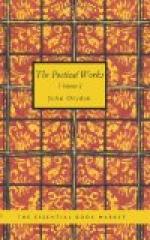A foe profess’d to him, and all his kind:
Some haggard Hawk, who had her eyrie nigh,
Well pounced to fasten, and well wing’d to fly;
One they might trust, their common wrongs to wreak:
The Musquet and the Coystrel were too weak, 1120
Too fierce the Falcon; but, above the rest,
The noble Buzzard[137] ever pleased me best;
Of small renown, ’tis true; for, not to lie,
We call him but a Hawk by courtesy.
I know he hates the Pigeon-house and Farm,
And more, in time of war has done us harm:
But all his hate on trivial points depends;
Give up our forms, and we shall soon be friends.
For Pigeons’ flesh he seems not much to care;
Cramm’d chickens are a more delicious fare. 1130
On this high potentate, without delay,
I wish you would confer the sovereign sway:
Petition him to accept the government,
And let a splendid embassy be sent.
This pithy speech prevail’d,
and all agreed,
Old enmities forgot, the Buzzard should
succeed.
Their welcome suit was granted
soon as heard,
His lodgings furnish’d, and a train
prepared,
With B’s upon their breast, appointed
for his guard.
He came, and crown’d with great
solemnity; 1140
God save king Buzzard, was the general
cry.
A portly prince, and goodly
to the sight,
He seem’d a son of Anak for his
height:
Like those whom stature did to crowns
prefer:
Black-brow’d, and bluff, like Homer’s
Jupiter:
Broad-back’d, and brawny-built for
love’s delight;
A prophet form’d to make a female
proselyte.
A theologue more by need than genial bent;
By breeding sharp, by nature confident.
Interest in all his actions was discern’d;
1150
More learn’d than honest, more a
wit than learn’d:
Or forced by fear, or by his profit led,
Or both conjoin’d, his native clime
he fled:
But brought the virtues of his heaven
along;
A fair behaviour, and a fluent tongue.
And yet with all his arts he could not
thrive;
The most unlucky parasite alive.
Loud praises to prepare his paths he sent,
And then himself pursued his compliment;
But by reverse of fortune chased away,
1160
His gifts no longer than their author
stay:
He shakes the dust against the ungrateful
race,
And leaves the stench of ordures in the
place.
Oft has he flatter’d and blasphemed
the same;
For in his rage he spares no sovereign’s
name:
The hero and the tyrant change their style
By the same measure that they frown or
smile.
When well received by hospitable foes,
The kindness he returns, is to expose:
For courtesies, though undeserved and
great, 1170




